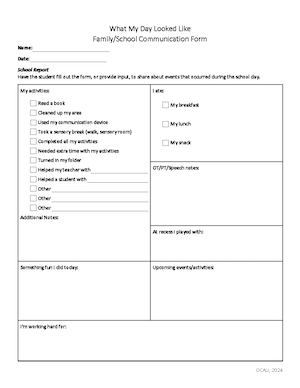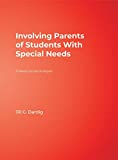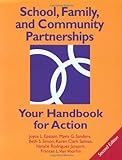Autism Center Grab and Go Resource Gallery of Interventions
Family / School Communication Forms
Consider using Family/School Communication Forms to exchange information between an individual's family and educational team. These communication forms can foster stronger family engagement, lessen barriers, and provide support for all individuals. Improving the quality of communication with family-school partnerships has been shown to greatly impact students' success in and out of school. These communication forms should focus on exchanging positive information about the individual and sharing information that may impact the individual in one or more settings. Ideally, if the individual can complete the forms themselves, they should be encouraged to use the form to provide input about their day and/or week. When deciding which form to use with the individual, keep in mind their learning style preferences, such as text only, images with text, icons, real photos or symbols.
These forms may help:
- Build a trusting relationship between school and family
- Build confidence in the individual's ability to communicate
- Set the foundation for implementing positive, proactive strategies
- Facilitate conversations about IEP goals and future planning
The individual's educational team should consult with the family on how best to disseminate the Family/School Communication form. Some may want to communicate daily while others may only need information weekly. It is best to have a conversation with the family to determine their preference and what works best for them. If preferred, these communication forms can be used electronically and sent via email or set up in an online sharing format.
Examples

Family / School Communication Forms

Involving Parents of Students with Special needs: 25 Ready-to-Use Strategies
Jill C. Dardig
This book offers 25 strategies for engaging parents, addressing interactions to teachers, and showing how to do everything from using email, letters, or phone to provide parents with effective communication paths with school personnel. The author also provides information to help parents teach kids at home and understand typical school and home conflicts. The samples of such communications form a particularly valuable bridge to understanding.

School, Family, and Community Partnerships: Your Handbook for Action
Joyce Epstein
When schools, families, and communities collaborate and share responsibility for students' education, more students succeed in school. Based on 30 years of research and fieldwork, this fourth edition of a bestseller provides tools and guidelines to use to develop more effective and equitable programs of family and community engagement. Written by a team of well-known experts, this foundational text demonstrates a proven approach to implement and sustain inclusive, goal-oriented programs. Readers will find: - Many examples and vignettes - Rubrics and checklists for implementation of plans - CD-ROM complete with slides and notes for workshop presentations.